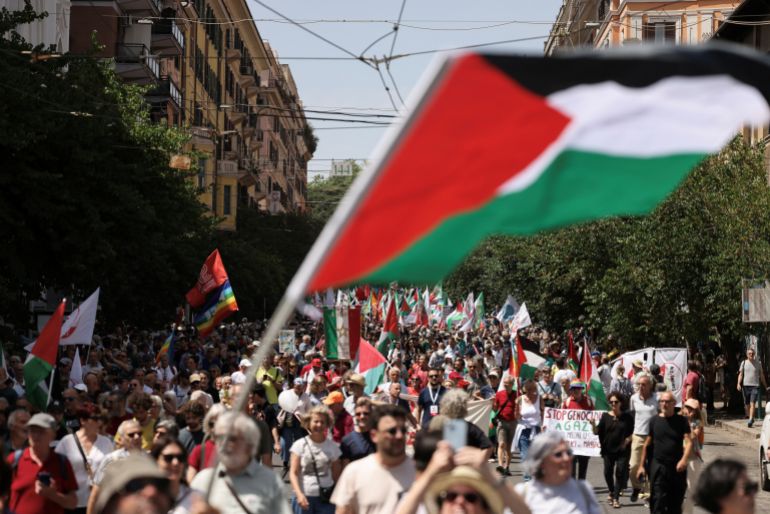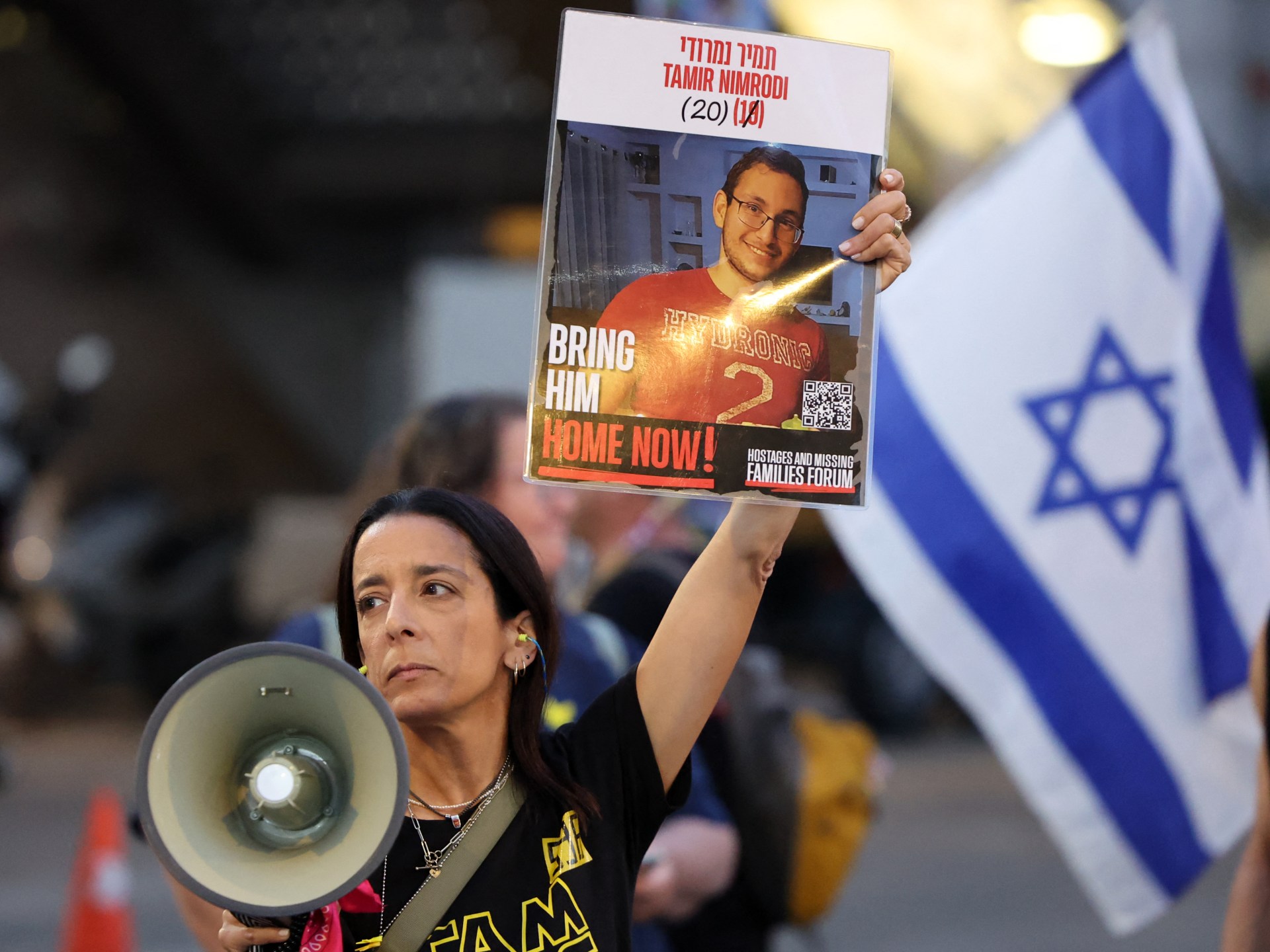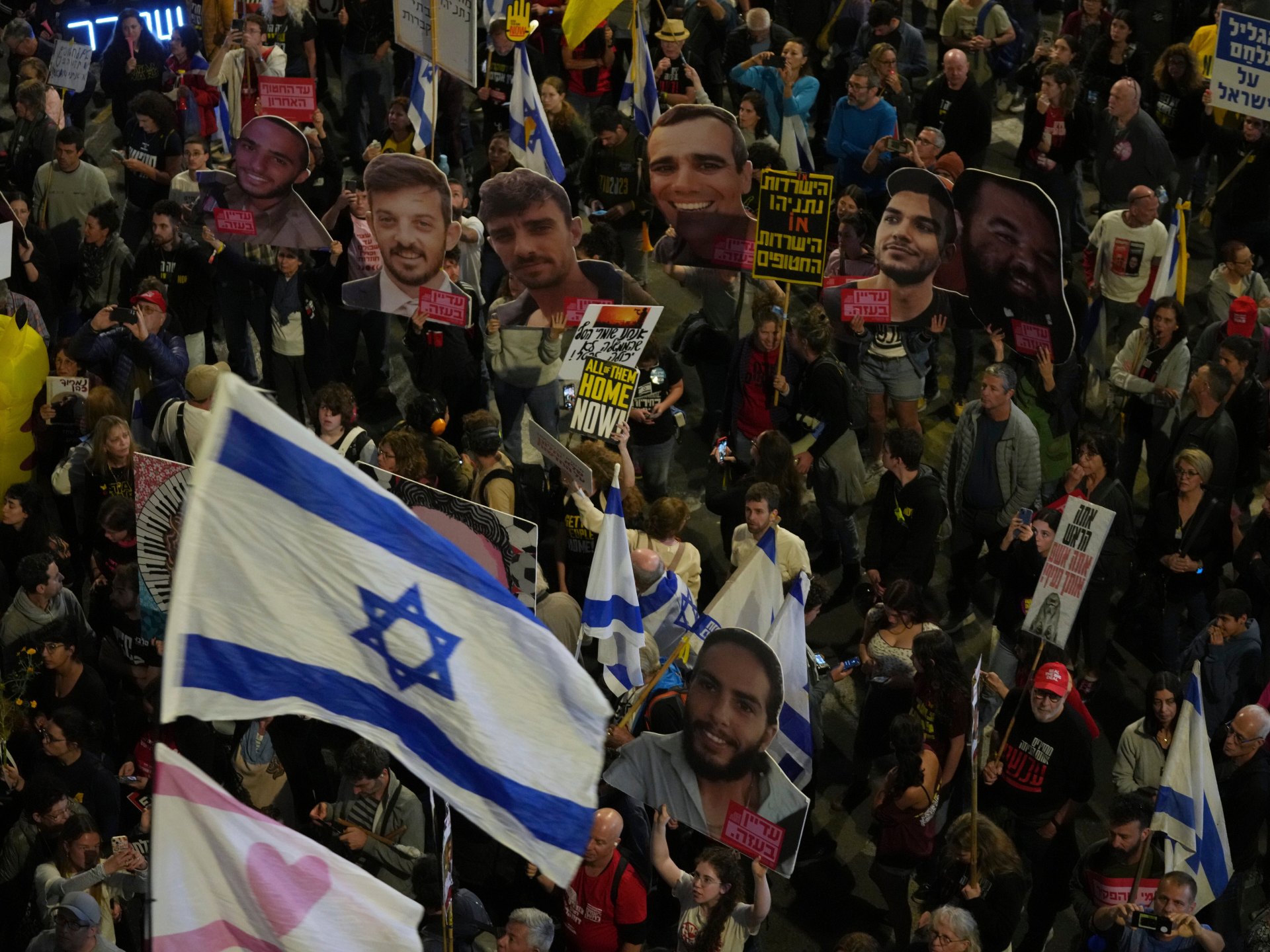Israelis demand return of captives; pro-Palestine rallies held in Europe | Israel-Palestine conflict News
Thousands of Israeli protesters in Tel Aviv have again called for the return of captives held in Gaza and an immediate ceasefire, while hundreds of thousands of pro-Palestine supporters gathered in Rome denouncing the Italian government’s “complicity” in the war.
Captive families and antigovernment protesters gathered in front of Israel’s army headquarters on Saturday, several hours after Thailand’s Ministry of Foreign Affairs reported that Israeli forces had recovered the body of a Thai captive.
In a statement, the Israeli army said on Saturday morning that the body of Nattapong Pinta was retrieved from the Rafah area in southern Gaza after he was taken captive during Hamas’s October 7, 2023, attack.
The Hostages and Missing Families Forum wrote on X that it “bows its head in sorrow over the murder of Nattapong Pinta”.
“The time is running out for all 55 hostages. We must bring them all home, Now!,” the group wrote on X.
The spokesperson of Hamas’s armed wing, the Qassam Brigades, Abu Obeida, warned that an Israeli captive, Matan Zangauker, is being held in an area targeted by the Israeli army.
He warned that if Zangauker were killed during an attempt to free him, the Israeli military would be responsible.
The captive’s mother, Einav Zangauker, speaking at the Tel Aviv protest, criticised Israeli Prime Minister Benjamin Netanyahu for neglecting those being held in Gaza.
“The military pressure is closing in on [my son] and is placing him in immediate danger. The decision to expand the ground operation comes at the cost of Matan’s life and the lives of all the hostages,” she said.
“[Netanyahu] continues to sacrifice the hostages. He is using the [Israeli military] not to protect Israel’s security, but to continue the war and protect his government.”
Police prevented activists from the NGO, Looking the Occupation in the Eye, from reaching the protest area in Tel Aviv, according to reports in the Israeli media. The activists were reportedly carrying placards protesting against Israeli war crimes and ethnic cleansing in Gaza.
אלימות מצד המשטרה, דחיפות וצעקות לעבר מפגינים הנושאים שלטים הקוראים להפסקת המלחמה.
07.06.2025 תל אביב 🎥אריק סגל pic.twitter.com/2vJ3lFkXDl
— אלימות ישראל (@Alimut_Israel) June 7, 2025
Translation: Police pushing and shouting at protesters carrying signs calling for an end to the war.
During the Hamas attack, which killed 1,139 people in southern Israel, the group abducted 251 people; following a series of prisoner-for-captive exchanges with the Israeli government, the group are currently holding 55 captives in Gaza, a number of whom are dead.
Israel’s war on Gaza has now killed at least 54,772 Palestinians and injured 125,834 others, Gaza’s Health Ministry reported.
‘Enough to the massacre of Palestinians’
In the meantime, across Europe, pro-Palestine demonstrators called for an end to the Israeli genocidal assault in Gaza.
In Rome, hundreds of thousands of people marched through the city in a protest called by opposition parties slamming the government’s “complicity” in the war.
The leader of the main opposition Democratic Party, Elly Schlein, called the turnout “an enormous popular response” in opposition to Israel’s actions in the besieged and bombarded enclave.
The demonstration was “to say enough to the massacre of Palestinians, to say enough to the crimes of Netanyahu’s far-right government” and to show the world “another Italy”, Schlein told reporters.
Prime Minister Giorgia Meloni has come under increasing pressure to take a stronger stance on the war in Gaza as she has backed Israel and Netanyahu throughout, while admitting difficult conversations with the Israeli leader of late.

In the British capital, London, antigovernment demonstrators held placards demanding “Cut war, not welfare.”
Speaking at the Whitehall rally, former Labour Party leader Jeremy Corbyn said with the “abominable, deliberate starvation of children in Gaza and the genocide that’s inflicted against the Palestinian people”, a world of “peace” was needed.
“We need a world of peace that will come through the vision of peace, the vision of disarmament and the vision of actually challenging the causes of war, which leads to the desperation and the refugee flows of today,” he said.
Pro-Palestine protests were also held Saturday in Denmark, Sweden, and Germany, where demonstrators raised banners calling for an end to the Israeli genocide against Palestinians.


